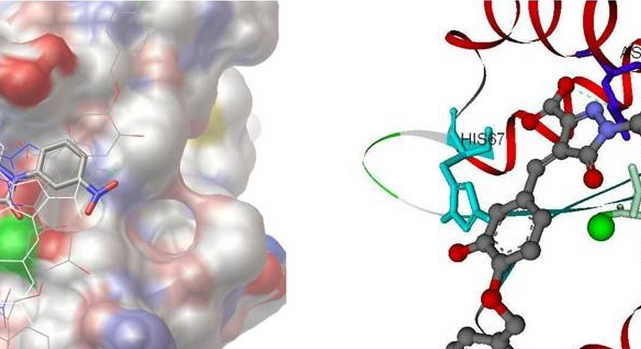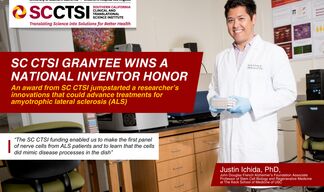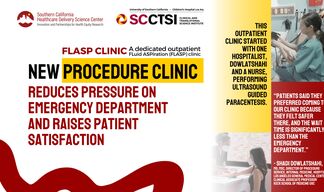USC Researchers Develop Novel Approach to the Discovery of New HIV Drugs
SC CTSI supports interdisciplinary team in addressing urgent need for lifesaving medicines.
Researchers from USC’s Department of Chemistry and the School of Pharmacology and Pharmaceutical Sciences have demonstrated a way to generate potential new drugs to halt the replication of HIV in infected patients by inhibiting a crucial enzyme in the HIV reproductive cycle.
The research team, led by Kyung Jung, PhD, associate professor at the Loker Hydrocarbon Research Institute and the USC Department of Chemistry, showed how it is possible to generate new inhibitors of integrase, a promising target for HIV drug development, by altering a molecule called the pyrazolone scaffold.

Kyung Jung, PhD
"By manipulating the pyrazolone molecule in various ways, we were able to develop and test promising new agents," said Jung. "We discovered new chemical entities that were effective in the inhibition of the integrase."

Left: Predicted binding conformations of compound inside the HIV-1 integrase active site. The lowest energy conformation is represented as a solid stick representation, while the rests are the other possible conformation. Right (B): Predicted protein-ligand interaction between compound with HIV-integrase. Three residues show interactions with this docked compound.
Lifesaving HIV drugs are losing their effectiveness
AIDS affects nearly 40 million people worldwide. Since its detection in 1981, more than 25 million people have died of the disease, making it the fourth-largest cause of death globally, according to the World Health Organization.
Medicine's battle against AIDS leapt forward in 1996 with the introduction of antiretroviral drugs that suppressed the replication of the virus in the body by interfering with the function of HIV enzymes.
New medicines, however, are critically needed because HIV mutates quickly into drug-resistant strains, rendering older medicines ineffective.
Currently, a cocktail of three drugs is considered the best therapy for HIV patients. It has enabled millions with HIV to thrive for years in relatively good health, halting or slowing what had once been a nearly inevitable progression to collapse of the immune system and the onset of fatal opportunistic infections and diseases.
More than 20 drugs have been approved by the U.S. Food and Drug Administration (FDA) to treat HIV/AIDS. Two drugs have been developed to inhibit integrase, one of which has received FDA approval. But, like other HIV drugs, those initial integrase inhibitors can also be expected to lose their effectiveness.
"Once the first generation of integrase inhibitors becomes commonly used in the clinic, the emergence of resistant HIV virus strains is inevitable," said Jung. "That’s why a second generation is so urgently needed."
SC CTSI support leads to patent
The project was supported by an SC CTSI pilot funding award designed to accelerate the translation of basic research into real-world applications. These awards support research, team building and career development efforts in all phases of translational research from pre-clinical studies to clinical interventions and community-partnered research to deliver health solutions.
The research team also uncovered a new target against HIV, called APE1, that could also lead to novel medicines. As a result, investigators filed a provisional patent based on their work.
They published their findings in Bioorganic & Medicinal Chemistry Letters.
Now, the researchers are seeking additional support to continue their search for potential new HIV/AIDS drugs.
SC CTSI is part of the 60-member Clinical and Translational Science Awards (CTSA) network funded through the National Center for Advancing Translational Sciences (NCATS) at the NIH (Grant Number UL1TR000130). Under the mandate of “Translating Science into Solutions for Better Health,” SC CTSI provides a wide range of resources, services, funding, and education for researchers and promotes online collaboration tools such as USC Profiles.



